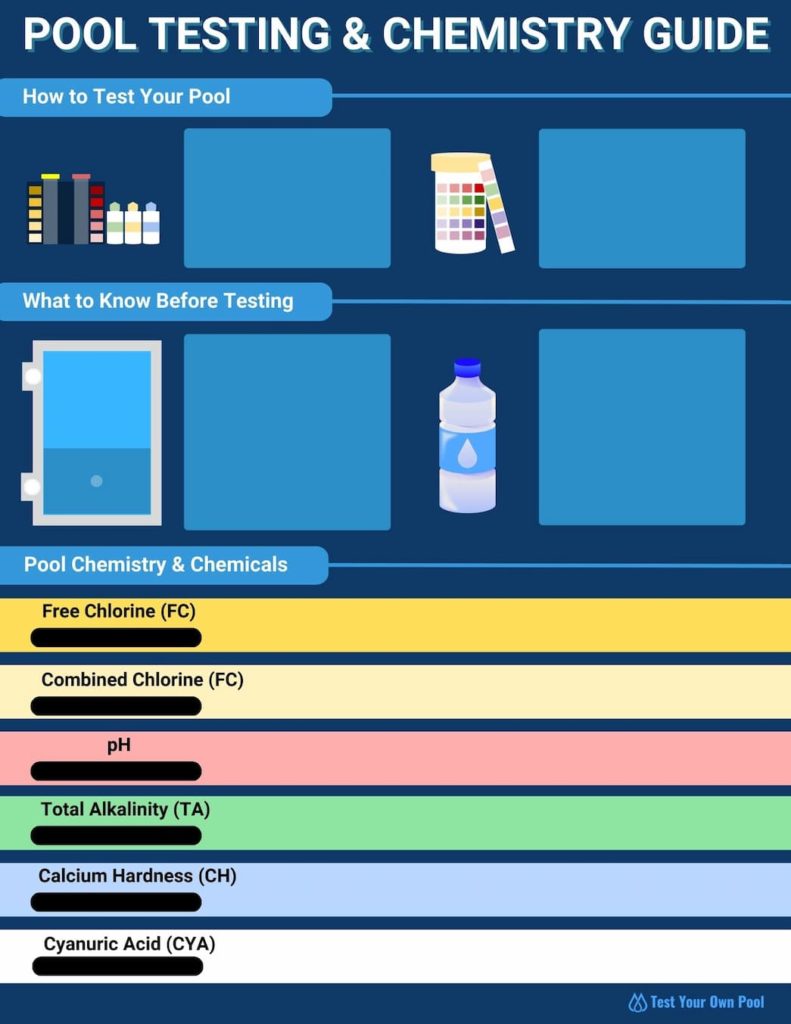Do you know how much chlorine you need to add to your pool?
Knowing the right amounts needed for everyday chlorine sanitation is important. This is where the pool chlorine calculator comes in handy!
This chlorine calculator can hopefully take some of the guesswork out of the dosage and give you better control of overall chlorine use.
Using the Pool Chlorine Calculator
There are a couple of items that you will need to know before being able to use the chlorine calculator.
- The pool’s volume in gallons. If unsure, use the volume calculator below for a close estimate.
- What type of chlorine is being used? For liquid chlorine and calcium hypochlorite, the percent strength will be needed.
- The current free chlorine (FC) levels in the water.
- The targeted FC levels.
- An optional item is current CYA levels. This will detail if you are currently within the recommended CYA ranges and what FC should be in relation to CYA.

Need a Refresher on Chemistry Readings?
Free chlorine, CYA, and combined chlorine, oh my! Download our handy guide for a quick and easy review of what chemistry parameters to test and which chemicals to use.
Know The Pool’s Volume
The most important aspect of any pool’s chemical dosage is how much water the pool has. For example, a 20,000-gallon pool will need significantly more chemicals than a 5,000-gallon above-ground pool.
The most effective way to determine the pool’s volume is by looking at the build schematics or asking the builder for that information if they still have it.
Otherwise, we can get a pretty good estimate by using a pool volume calculator.
What Chlorine Is Being Used
There are many different types of chlorine to sanitize the pool. Each type has various percent strengths; for example, liquid chlorine is usually 10 to 13% strength while trichlor is 90%.
For this chlorine calculator, the strengths for liquid chlorine and calcium hypochlorite (cal-hypo) will need to be manually entered because they come in a variety of strengths. Otherwise, trichlor (90%), dichlor (56%), and lithium hypochlorite (35%) have default strengths.
Get the Latest Testing Results
We want to be accurate when determining how much chlorine to add. Adding too little can lead to major water issues like algae growth, so reliable test numbers are necessary.
A FAS-DPD chlorine test kit is highly recommended as it will have the highest accuracy for chlorine readings.
The most accurate and reliable pool testing kit.
Type of Chlorine Test: FAS-DPD
Read our full Taylor K-2006 Review.
Get to Chlorinating!
Hopefully, this calculator will help determine how much liquid chlorine to add to the pool or even how much FC is needed based on current CYA readings.
As always, test after each chemical addition to make sure you are in the right range. If using a lot of chlorine, start in small doses until you reach the target FC.

